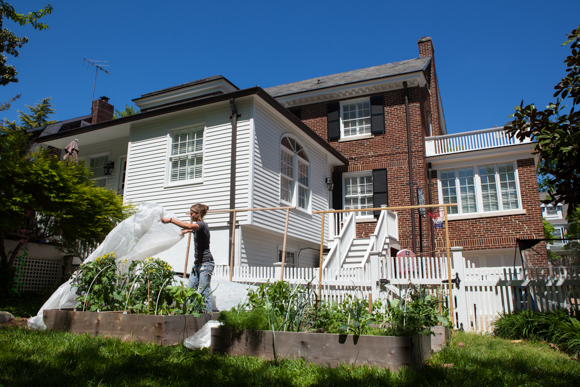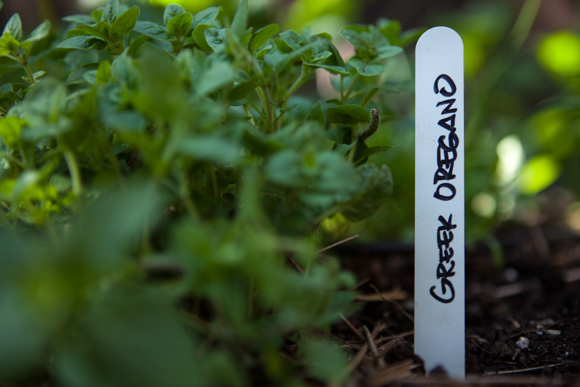It’s that time of year when, beckoned by the idealism of spring and a desire to grow their own food, people decide to plant an urban garden. Many of them (and I would include myself in this category) have no business doing so.
And after those initial endeavors have shown forth their (lack of) fruit, these people call Meredith Sheperd.
Sheperd has made a business, called
Love & Carrots, out of rescuing D.C. urbanites from their backyard black thumbs. Her team of seven helps residents design, build and maintain their own edible and organic gardens, almost regardless of space, water and sunlight restrictions (Sheperd says she’ll call her first book
How to Make the Most of Your Shady, Small Back Patio).
While landscape designers have always been common in the District, most focus on ornamental plants. Shepard's business model, which turns those tiny D.C. backyards into growing spaces for edible plants, is new, but it taps into a growing trend. As more people look to get in touch with the source of their food — and to get some dirt under their nails in the process — businesses like Sheperd’s have been cropping up around the country to help them. Sheperd recently attended a summit in Seattle with a handful of similar companies based out of Boston, L.A., Denver and Portland.

In D.C.,
My Organic Garden offers similar home gardening services to Sheperd’s, but owner Joshua Wenz has been scaling back his operation and sending extra customers to Love & Carrots. This makes Love & Carrots arguably the most successful urban gardening company in D.C.
In its three-year history, Sheperd’s company has planted the seeds for 120 gardens in the region, about 50 of which the team maintains on a regular basis. A new garden installation can range from $700 for a simple setup to $15,000 for a backyard menagerie, with the average garden costing $1,500.
The process can be limited to garden design — Sheperd’s hand-drawn mockups are works of art — or extended to one-on-one coaching to help residents take over the project themselves.
Some customers opt for the company to do continual maintenance while others are in it for the hands-on gardening lessons.
“There’s almost nothing we won’t do,” Sheperd says, then thinks for a moment. “OK, I won’t drive to Potomac for one tomato plant.”
Restaurant gardens
The sprawling garden at Bloomingdale’s
Big Bear Café, one of the handful of D.C. area restaurants looking to source some of their produce in-house, is also evidence of Sheperd’s green touch.
Café owner Stuart Davenport says Sheperd, who lives nearby, spent so much time at the café that she offered one day to “clean this place up,” referring to the disheveled garden.
"Edible gardens make the most sense [for restaurants] because it just lets people understand more of what they�re a part of." - Big Bear Cafe owner Stuart Davenport
The two 8-by-15-foot beds plus some planter boxes are now home to arugula and broccoli that often star in the café’s morning omelets. The garden’s herbs are featured in several dishes throughout the day, though the larger quantities of vegetables needed for the dinner crowd are still purchased from area farmers.
“People see the squash blossoms (in the garden) and expect squash. So we’ll do a special, but we go through it in a week,” Davenport says.
Even if the small garden plots can’t feed the restaurant fully, Davenport says the best perk is the ambiance it adds to the place.
He’s let the arugula go to seed this year because its flowers are so pretty (besides, he thinks the flowery arugula tastes a bit sweeter, with its starches broken down).
“I think the edible gardens make the most sense [for restaurants] because it just lets people understand more of what they’re a part of” when they eat at the restaurant, Davenport says. Grapevines winding through the garden are there because the café serves wine, he says, and hops sprawl up a wall because beer is on the menu.
But Davenport says the whole garden would go bust without Sheperd’s help. She’s set up automatic timers to water the plants and “secretly runs the show” by checking in regularly.
For-profit urban ag
Sheperd says her expertise is best used on small, impossible-to-garden plots in D.C.’s most urban neighborhoods.

She started the business because she was fascinated with urban agriculture — growing food in a backyard or on a rooftop or a school playground — but struggled to find a job that paid her well enough to do it. Most community or school gardens in the region are run by nonprofits, Sheperd says, and were looking for candidates with a mix of master’s degrees and unpaid internships.
But Sheperd wanted to make a living. She bootstrapped her business into action “with me and my Subaru” in 2010, and has been trying to keep up with demand ever since.
“I’m really proud of the fact that it’s for profit. That was part of my decision to go into [business]…because having to fundraise is a full-time job,” says Sheperd, who also works pro bono with school and community garden programs in the area.
“There’s just so much room to grow food and nobody’s doing it.”
An earlier version of this story misspelled Meredith Sheperd's name. Elevation DC regrets the error.